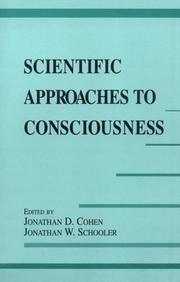| Listing 1 - 10 of 11 | << page >> |
Sort by
|
Book
Year: 2016 Publisher: National Bureau of Economic Research
Abstract | Keywords | Export | Availability | Bookmark
 Loading...
Loading...Choose an application
- Reference Manager
- EndNote
- RefWorks (Direct export to RefWorks)
Book
ISBN: 9780197604885 Year: 2022 Publisher: New York, N.Y. Oxford University Press
Abstract | Keywords | Export | Availability | Bookmark
 Loading...
Loading...Choose an application
- Reference Manager
- EndNote
- RefWorks (Direct export to RefWorks)
Psychology --- Ethics and addiction --- United States of America
Book
ISBN: 9781405117616 9781405117609 1405117613 1405117605 Year: 2007 Volume: 8 Publisher: Malden : Blackwell Pub.,
Abstract | Keywords | Export | Availability | Bookmark
 Loading...
Loading...Choose an application
- Reference Manager
- EndNote
- RefWorks (Direct export to RefWorks)
Philosophical anthropology --- Philosophy of mind. --- Sciences cognitives --- Philosophie de l'esprit --- Philosophy of mind --- Mind, Philosophy of --- Mind, Theory of --- Theory of mind --- Philosophy --- Cognitive science --- Metaphysics --- Sciences cognitives. --- Philosophie de l'esprit.

ISBN: 9780805814729 9780805814712 0805814728 080581471X Year: 1997 Publisher: Mahwah, N.J. : L. Erlbaum,
Abstract | Keywords | Export | Availability | Bookmark
 Loading...
Loading...Choose an application
- Reference Manager
- EndNote
- RefWorks (Direct export to RefWorks)
Consciousness --- Cognition --- Consciousness. --- Cognition. --- Human information processing. --- Conscience --- Information, Traitement de l', chez l'homme --- Human information processing
Book
ISBN: 1943859612 Year: 2018 Publisher: Reno : University of Nevada Press,
Abstract | Keywords | Export | Availability | Bookmark
 Loading...
Loading...Choose an application
- Reference Manager
- EndNote
- RefWorks (Direct export to RefWorks)
Gambling industry --- Gambling --- History
Digital
Year: 2015 Publisher: Cambridge, Mass. National Bureau of Economic Research
Abstract | Keywords | Export | Availability | Bookmark
 Loading...
Loading...Choose an application
- Reference Manager
- EndNote
- RefWorks (Direct export to RefWorks)
Heuristic models have been proposed for many domains of choice. We compare heuristic models of intertemporal choice, which can account for many of the known intertemporal choice anomalies, to discounting models. We conduct an out-of-sample, cross-validated comparison of intertemporal choice models. Heuristic models outperform traditional utility discounting models, including models of exponential and hyperbolic discounting. The best performing models predict choices by using a weighted average of absolute differences and relative (percentage) differences of the attributes of the goods in a choice set. We conclude that heuristic models explain time-money tradeoff choices in experiments better than utility discounting models.
Digital
Year: 2016 Publisher: Cambridge, Mass. National Bureau of Economic Research
Abstract | Keywords | Export | Availability | Bookmark
 Loading...
Loading...Choose an application
- Reference Manager
- EndNote
- RefWorks (Direct export to RefWorks)
We review research that measures time preferences - i.e., preferences over intertemporal tradeoffs. We distinguish between studies using financial flows, which we call "money earlier or later" (MEL) decisions and studies that use time-dated consumption/effort. Under different structural models, we show how to translate what MEL experiments directly measure (required rates of return for financial flows) into a discount function. We summarize empirical regularities found in MEL studies and the predictive power of those studies. We explain why MEL choices are driven in part by some factors that are distinct from underlying time preferences.
Book
Year: 2015 Publisher: Cambridge, Mass. National Bureau of Economic Research
Abstract | Keywords | Export | Availability | Bookmark
 Loading...
Loading...Choose an application
- Reference Manager
- EndNote
- RefWorks (Direct export to RefWorks)
Heuristic models have been proposed for many domains of choice. We compare heuristic models of intertemporal choice, which can account for many of the known intertemporal choice anomalies, to discounting models. We conduct an out-of-sample, cross-validated comparison of intertemporal choice models. Heuristic models outperform traditional utility discounting models, including models of exponential and hyperbolic discounting. The best performing models predict choices by using a weighted average of absolute differences and relative (percentage) differences of the attributes of the goods in a choice set. We conclude that heuristic models explain time-money tradeoff choices in experiments better than utility discounting models.
Book
Year: 2016 Publisher: Cambridge, Mass. National Bureau of Economic Research
Abstract | Keywords | Export | Availability | Bookmark
 Loading...
Loading...Choose an application
- Reference Manager
- EndNote
- RefWorks (Direct export to RefWorks)
We review research that measures time preferences--i.e., preferences over intertemporal tradeoffs. We distinguish between studies using financial flows, which we call "money earlier or later" (MEL) decisions and studies that use time-dated consumption/effort. Under different structural models, we show how to translate what MEL experiments directly measure (required rates of return for financial flows) into a discount function over utils. We summarize empirical regularities found in MEL studies and the predictive power of those studies. We explain why MEL choices are driven in part by some factors that are distinct from underlying time preferences.
Book

ISBN: 9781400883172 Year: 2016 Publisher: Princeton, NJ
Abstract | Keywords | Export | Availability | Bookmark
 Loading...
Loading...Choose an application
- Reference Manager
- EndNote
- RefWorks (Direct export to RefWorks)
| Listing 1 - 10 of 11 | << page >> |
Sort by
|

 Search
Search Feedback
Feedback About UniCat
About UniCat  Help
Help News
News